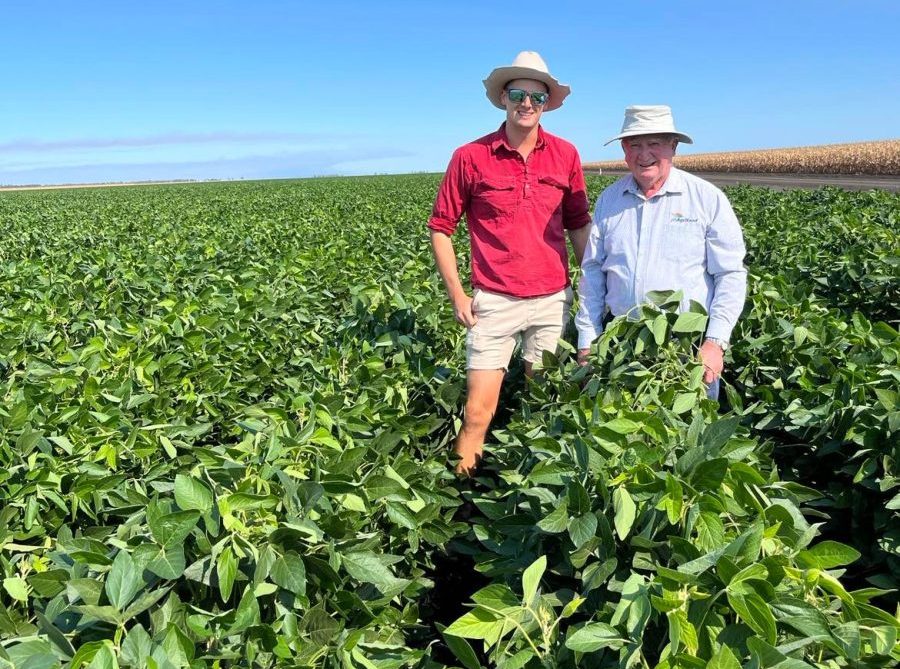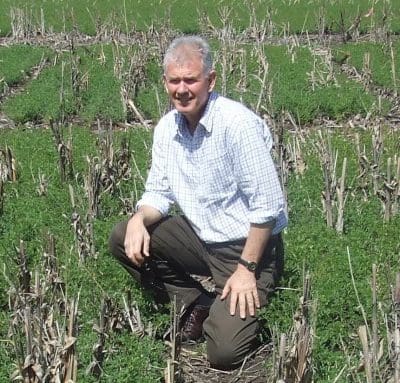
Brookstead grower Damian Clapham and PB Agrifood director Peter Brodie in a soybean crop at the Claphams’ farm. PB Agrifood is one of the value-adding businesses which will open its doors to APC2023 delegates . Photo: PB Agrifood
PARTICIPANTS from all parts of the pulse supply chain are preparing to gather in Toowoomba later this month for the triennial Australian Pulse Conference.
Being held in Toowoomba during March 21-23 and hosted by peak organisation Pulse Australia, the event is unique in the grain space for bringing together producers, researchers, marketers and trade representatives.
APC committee chair and Wilson International Trade principal Peter Wilson said the collegiate approach of the 2023 event will once again be its trump card.
“The Australian Pulse Conference does what a lot of industry conferences don’t do, and that is bring together high science, applied science, growers and marketers,” Mr Wilson said.
“It’s a whole-of-supply chain focus, instead of being what other industry conferences tend to be, and that’s commercial or research, and never the twain shall meet.”
Mr Wilson has been marketing pulses for 30 years, and has recently returned to his home on the Darling Downs from Dubai’s Gulfood, the world’s largest food exhibition.
“There was a lot of focus on sustainability there, and we will see that too at the Australian Pulse Conference here in Toowoomba.”
Australia is one of the world’s leading exporters of pulses, including chickpeas, faba beans, field peas, lentils, lupins and mungbeans, and has food and feed customers throughout Asia, the Middle East and Europe.
“Supply chains continue to get shorter, and people want to know where their food comes from.”
While prospects for plant-based protein was the hot topic of the previous APC, held in Horsham in Victoria in 2019 and ahead of COVID interruptions, Mr Wilson said biofortification is likely to feature in presentations and conversations at APC2023.
“That’s a way to value add for Australian growers by doing things like adding pulse flour to pasta, and the Australian Pulse Conference is the ideal place to have everyone talking about some of the market opportunities that are out there.”
“With everyone from breeders and plant scientists to growers and traders together, we can have a feedback loop that’s very short.”
“We see it when researchers travel to an overseas market, and we’ll see it in and around the conference sessions too talking about topics like millability of particular pulses and varieties, and eye appeal to the trader or consumer.”
Role in farming systems
Pulses have long been valued as a means of reducing input costs because they can be grown without applied nitrogen, and will mineralise nitrogen in the soil for following crops to use.
The surge in fertiliser prices seen since the second half of 2021 has prompted a renewed interest from growers across Australia in how pulses might fit into their farming systems.
At APC2023, University of New England Adjunct Professor David Herridge will look at pulses in a historical context and the extent to which they contribute to soil nitrogen fertility and benefit other crops grown in rotation.

Dr David Herridge inspects a chickpea innoculation trial on the Liverpool Plains of NSW.
As one of APC2023’s keynote speakers, he will be presenting an address entitled From humble beginnings: The rise and rise of nitrogen fixation by pulses in Australia.
In previewing his talk to Grain Central, Dr Herridge said scientists first trumpeted the benefits of pulses in Australian farming systems as far back as the 1890s.
“What is certainly true is that when the price of fertiliser goes up, interest in pulses and legumes goes up, as farmers have always been interested in looking at ways to reduce input costs,” Professor Herridge said.
Nitrogen is now selling at around $2/kg, close to triple its early 2021 values, and roughly 80-140 units of N per hectare are needed to grow cereal and canola crops.
“We reckon the average pulse crop has a benefit of 60 units of N, or $120/ha, for a following cereal or canola crop and my talk will be highlighting the role pulses play in the nitrogen supply for grain cropping.”
The previous global spike in fertiliser prices was around 2008, fuelled by high crude oil prices that sparked a surge in production of crops for ethanol.
“More farmers switched on to pulses then, and that’s probably where we’re at now again.”
“If you are canny with your cropping program, you can be better protected against those spikes in fertiliser prices.”
“The story doesn’t change.”
Broader choices
Advances in breeding and agronomic management have seen pulse varieties developed for a broader range of regions, soil types and climates, and away from the limited options that prevailed for many years.
“It was basically field peas in the south, and lupins in the west, and for a long time, that’s all there was.”
Dr Herridge said the emergence of desi chickpeas as a cash crop and excellent disease management packages brought pulses north, and they are now grown with success in a range of environments.
Research has reliably shown that diversity in farming systems brings benefits beyond the cropping year, and growers now have more to choose from, with mung, soy and faba beans and lentils all being valuable additions.
“Faba bean is a particularly good nitrogen fixer compared to pea and chickpea, and that’s something that’s been looked at by researchers in Queensland and NSW.”
“Because of their biomass and ability to continue to fix nitrogen in the presence of soil nitrate, faba bean, lupin and vetch are probably the best nitrogen-fixing pulses, but the ultimate choice farmers make about which pulse to grow comes down to the price of the commodity.
“We saw that with chickpeas; when they got to $800-$900 a tonne, everyone wanted to grow them, and now that the price has eased, growers will more than likely consider all options.”
Read more about APC2023 or visit the conference website:

HAVE YOUR SAY